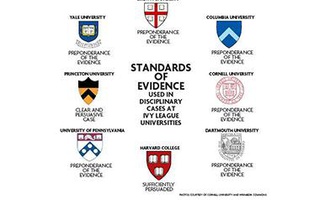I would like to be unbiased, open to new ideas, accepting of arguments that contradict my own beliefs. I am willing to put a good deal of effort into achieving these traits, because they seem unequivocally good, the hallmarks of a reasonable person. However, when I pick up a newspaper and begin reading an op-ed that I disagree with, I instinctively want to put down the paper and stop reading.
It should not be hard to read opinions that are out of line with my own—I am not so naïve as to think that my opinions represent a universal consensus—but I experience an almost visceral, negative reaction to strongly-worded arguments for beliefs that run counter to mine. This reaction is ingrained in human psychology, and helps explain why it is so difficult to truly open one’s mind and take a non-partisan approach to political issues. Confidence, on the whole, feels good. When we are confident in our opinions, we feel better about our choices, our abilities, and ourselves. Unfortunately, the human sense of confidence is derived in such a way that dissenting opinions tend to damage it, making those opinions unpleasant.
Confidence in our beliefs is based mainly on the coherence of the evidence for them, rather than the magnitude of the evidence. If I have ten pieces of evidence in favor of a belief, I will not be much more confident in that belief than if I had five. If, however, I have one piece of evidence in favor of one belief, and for another belief I have two pieces of evidence in favor, but one piece of evidence against, I will be probably more confident in the first belief. This is because all of the evidence for the first belief is coherent, whereas, even though the number of pieces of evidence in favor of the second belief is greater, the coherence of the evidence is not as great—some of the evidence is contradictory.
Naturally, the more evidence one uncovers about a given topic, the more likely one is to come across contradictory arguments. As a consequence, the less informed we are about a topic, the more likely we are to feel irrationally confident about a strongly partisan opinion. Essentially, we are rewarded for ignorance with the pleasant feeling of confidence. Technology, often a powerful force for greater dissemination of knowledge, may actually decrease the chances of overcoming our blinders of ignorance on controversial topics.
The internet has given us greater access to a wide variety of opinions on a nearly infinite list of subjects, and it is easy to assume that this should help combat close-mindedness. However, an abundance of un-vetted blog posts with no pretension to nonpartisanship has also made it much easier to find opinions that merely corroborate our own preconceptions. In an online landscape with political commentary to cater to any taste, there is no longer any need to encounter the unpleasantness of opposing arguments.
The revolution in personal data analytics further exacerbates this problem by intentionally guiding us towards opinions that reinforce rather than challenge our biases. Google’s search engine delivers individualized search results based on what you have clicked in the past. The New York Times website automatically generates a list of articles that are “recommended for you” based on those you have previously viewed. Youtube, unsurprisingly, puts personal recommendations on the homepage of its site.
To be sure, there is no harm in a computer algorithm that automatically creates a list of the cat videos and “Call Me Maybe” parodies most likely to make you laugh, but the march towards a personalized Internet is already making the digital realm less like a virtual public library and more like a private book collection, pre-populated with your favorite authors.
There are important benefits to actively seeking out opinions from the other side—one’s own argument will undoubtedly be improved by an understanding of the counter-arguments, but, perversely, one’s confidence in their own position may be shaken.
Rather than passively perusing the internet, allowing ourselves to be unconsciously guided towards articles, blogs, and videos that affirm our own ideas, we would do well to seek out sources that will challenge our preconceptions. For liberal students, the Wall Street Journal opinion pages provide high quality conservative commentary. For the republicans on campus, the New York Times editorials are worth reading, if only to allow for further complaining about the hopelessly biased, liberal media. Although we are hard-wired to dislike ideas that we do not agree with, those ideas are often the most important ones for us to appreciate, and making a concerted effort to understand them is well worth the effort.
Nick M. Phillips ‘16, a Crimson editorial writer, lives in Greenough Hall.
Read more in Opinion
Assessing a Legal Framework for Drone StrikesRecommended Articles
-
The Century for June.The most noteworthy contribution to the June number of the Century is the first installment of a new story, "The
-
President Lowell and the Sacco-Vanzetti CaseFrom new on, I want to knew, will the institution of learning in Cambridge, which once we called Harvard, be
-
Reconsidering Extraterrestrial VisitationIf we are to hold UFO reports to the abnormally high standards of evidence currently deemed acceptable, we must do so based on a reference frame derived from facts.
-
Alleged Gunman in Harvard Shooting Seeks Dismissal of ChargeThe attorney representing Jabrai Jordan Copney—the alleged gunman in the May 2009 Kirkland House shooting—has filed a series of motions that seek to exclude discussion of an alleged prior crime and evidence that the defense says was inappropriately seized by police.
-
Final Witnesses Called in Kirkland Shooting TrialWOBURN, Mass.—A chemical expert and a DNA analyst were called to the stand yesterday as the final witnesses in the trial of Jabrai Jordan Copney—the alleged shooter in the May 2009 slaying of Cambridge resident Justin Cosby that took place in Kirkland House.
-
 VAWA Renewal Could Spell Change
VAWA Renewal Could Spell Change













